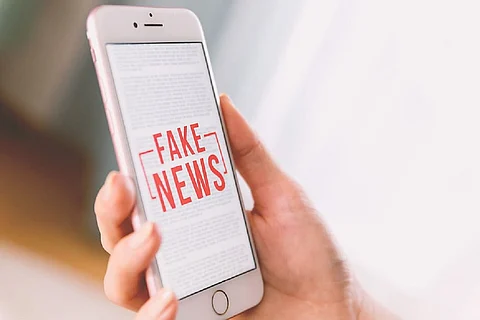

In this pandemic, all forms of media play a vital role and we have time and again seen how forwarded messages, misreporting, etc. are affecting our day today life. Media Literacy instruction is a very valuable means for the empowerment of people and to promote their participation in social, cultural, economic and political life, and helps ‘media literate’ people become engaged in their community.
These aspects and more were discussed at the 6-day International Webinar Series on Digital & Media Literacy in Disinformation Age from July 27 - August 1, 2020 by Kumaraguru College of Liberal Arts and Science.
“As an educational institution, the Department of Visual Communication, Kumaraguru College of Liberal Arts and Science (KCLAS), Coimbatore took on the responsibility of helping students, faculty and professionals, to identify Disinformation, and in turn, encourage them to actively participate in public affairs as a 'media literate' citizen,” shares Professor Leo Gertrude, Head of the Department, Department of Visual Communication, KCLAS.
This event was in partnership with UNESCO-GAPMIL (Global Alliance for Partnerships on Media and Information Literacy) and brought together some of the experts in the area of Media and Information Literacy. You can see the entire series here:
During the first webinar, on July 27, 2020, Dr. Firoz, Director - College of Management & Technology, School of Media & Communication, NSHM Knowledge Campus, Kolkata kick-started the webinar series with a session on ‘Key Concepts & Scope of Media Literacy’ explaining the theoretical building blocks of MIL.
“If we claim ourselves to be a media professional, we must transcend our educational background, our own personal interest, our political affiliations, and then claim ourselves to be a journalist,” Dr. Firoz said in conclusion.
Building upon that, on the second day of the webinar, Dr. Anubhuti, Head of the Department (New Media) & Course Director (Advertising & PR), Indian Institute of Mass Communication, New Delhi, delivered a practical-driven session on ‘Media Literacy in the Disinformation age’, with special focus on implementing Media Literacy in school curriculum, drawing out many practical examples from her experience with NCERT.
“We often come across debates and discussions that we are living in a time when we are surrounded by Misinformation. All of us are concerned about this huge problem that the entire world is facing. During the pandemic, lives were put at risk with the avalanche of misinformation regarding COVID 19. While it is difficult to control the flow of such information, media and information literacy can lessen the impact of this problem by developing media and information literacy competencies amongst people. There is a need to have concerted efforts to make people media and information literate so that they can sail smoothly in the sea of information and media messages” shares Dr. Anubhuti.
The third day, the webinar saw discussions on ‘‘Media Literacy: Pictures & Pictorials’ by Dr. Jayaprakash, Director, PSG College of Arts and Science, Coimbatore. He explains that he isn't a wildlife photographer, “If you are a wildlife photographer, you need to work towards the conservation of the animals. You should not be disturbing it at its natural habitat. This is why I call myself a wildlife conservationist. I use such platforms to sensitize and make the future generations aware of the environmental impact of their actions.”
Talking about ‘Connecting Media & Information Literacy’ on July 30, 2020, Dr. Padma Rani, Director and Professor, Manipal Institute of Communication, MAHE Manipal, Karnataka explained that the media connects media and information literacy to media ethics. “The proliferation of digital technology has expanded the reach of media in terms of accessibility and usage. Therefore, citizens need to be well informed how to identify truth, deal with information overload and protect their own privacy” shared Dr. Padma Rani.
The last day of the webinar series had Dr. Alexandre Le Voci Sayad, a Brazilian Journalist and Educator, who is also the Co-Chair of UNESCO-GAPMIL, speaking about the role of UNESCO and the Global Alliance for Partnerships on Media and Information Literacy (GAPMIL) in World Media Literacy. Dr. Alexandre shares, “UNESCO-GAPMIL is proud to be partner of Kumaraguru College of Liberal Arts and Science, and its Digital Webinar Series - as we are both institutions committed to prepare professionals for ethical and responsible work in communication, information and education fields.”
“As a filmmaker, while creating documentaries, I make a conscious decision, of not allowing my own person biases from interfering with the narrative” says Prof. Meera Darji, a Professor and Filmmaker from Coventry University, UK, during her webinar on 30th July 2020. “I try to shoot everything, get different views, different layers, different perspectives, different strands of the the topic and try as far as possible, to keep everything that way, while editing. For this, it important to research everything beforehand.”
While students formed a major part of the viewers, faculty members, researchers and professionals also, formed a substantial percentage of the viewership.
There was also a substantial registration of participants from other countries like Philippines, Congo, UK, Pakistan, Sierra Leonne, Oman, United Arab Emirates, Colombia, New Zealand, Indonesia, etc.
Dexter Masongong, a student from San Pedro College, Davao City, Philippines shares his experience about the webinar “The six-day webinar series has been such an enjoyable experience. It has made me more aware of the power media can bring, thus in this age where fake news is prevalent, I have come to learn how to think more critically to recognize what's right from wrong. Overall, the discussion with the experts was satisfactory as they were able to effectively impart their knowledge regarding media literacy and cater to the questions of the audience given a short period.”